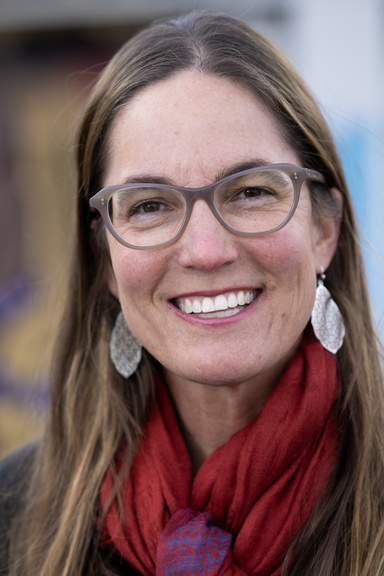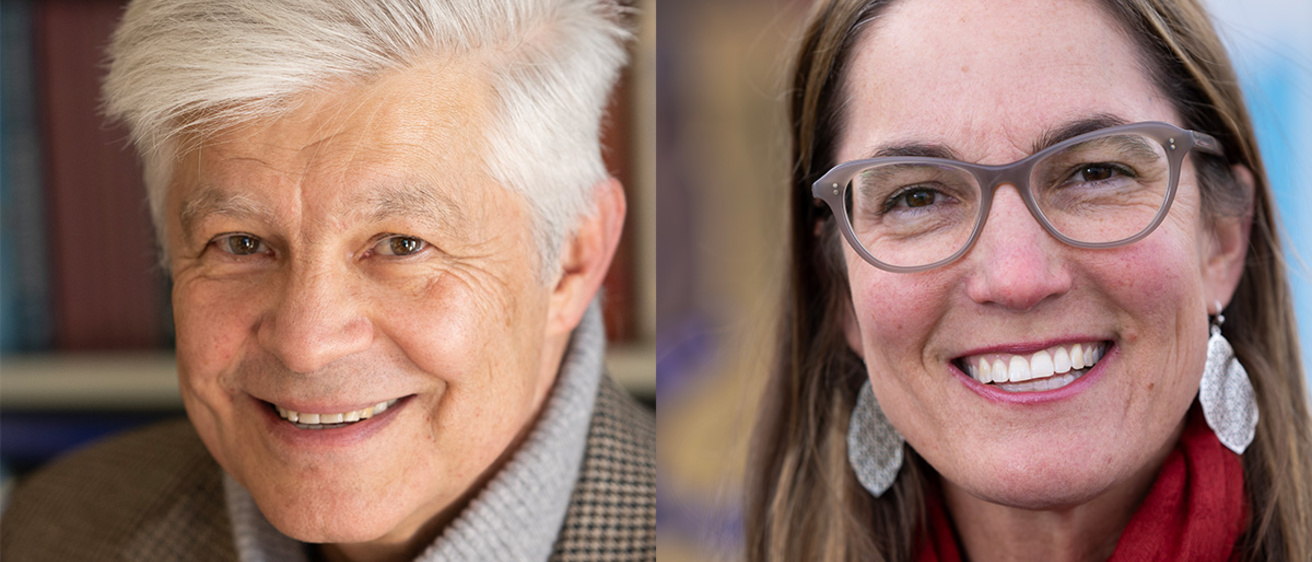The 40th annual Presidential Lecture will highlight two University of Iowa faculty members whose research provides value within Iowa, across the country, and around the world in a lecture titled “Rivers of Discovery: UI Research, Iowa, and the World.” The lecture will take place at 4 p.m. Thursday, March 2, at the International Ballroom in the Iowa Memorial Union. A reception will follow.
Witold Krajewski of the College of Engineering and Kristy Nabhan-Warren of the College of Liberal Arts and Sciences will present this year’s lecture.
Krajewski, the Rose and Joseph Summers Chair in Water Resources Engineering, director of the Iowa Flood Center, research engineer at the IIHR—Hydroscience and Engineering, and professor of civil and environmental engineering, will talk about his work in the Iowa Flood Center and how the publicly available tools can be used to forecast and fight floods.
Nabhan-Warren, associate vice president for research, professor and V.O. and Elizabeth Kahl Figge Chair in Catholic Studies in the departments of religious studies; gender, women’s and sexuality studies; and history will discuss how the power of storytelling and conversation can connect people and how no matter what profession you choose, anyone can be an agent of change.
Witold Krajewski

What is the topic of your lecture and why did you choose to discuss it?
The theme for the lecture is how research at the University of Iowa helps or is relevant to the people of Iowa. This is easy for me because the last 10 to 15 years of my research was devoted to floods. Since the inception of the Iowa Flood Center, we have developed a number of tools that are available to anyone who has access to the internet. These tools help people see what’s happening in the short term, but can also help them prepare and plan in the long term.
I also want to make a strong connection with the research because these tools are built upon a lot of time, effort, and thought.
What do you hope to convey and what are the big points you want people to take away?
One element I would like to communicate is flood forecasting and the challenge of forecasting streamflow at any place all the time. We were the first to do this in the country over a large domain, like Iowa. Most of my previous work was on remote sensing for rainfall using radars and satellites, because rainfall is the key agent for flooding, especially here in the plains. So it started with rainfall, then understanding river networks, from small streams to big rivers, then everything else that may lead to floods.
The second element is visualizing this information after we have it. One of the tools we have developed is the Iowa Flood Information System. We designed this system to be jargon-free so that it can be accessible to anyone. It is based on Google Maps and is an interactive system, intuitive to use. There was a lot of thinking that went into this system to make it rigorous but also easy to figure out. It has more than 4 million page views to date, so it shows the affinity people have for the system.
What makes Iowa City a great place to work, live, and study?
Before coming to Iowa, I lived for six years on the outskirts of Washington, D.C., which is where my wife is from. We moved here in 1987, and while Washington, D.C., is an exciting place, after six months of living here, we knew we were not going back. Iowa City is an excellent place to live, and I wouldn’t have wanted to raise our children anywhere else. Here they had access to not only a highly ranked public educational system, but also Iowa’s robust rural community that included 4-H activities that enriched their youth.
Being in research, I appreciate the access to technology and the atmosphere of a world-renowned research center. I have everything I need to do my research and I don’t have to plead for resources. There is always flexibility and support, and perhaps that is why I am successful at the IIHR. It has been a famous place among people in the discipline and it’s highly respected around the world. I consider myself lucky that I found this place and that the place found me.
What does it mean to have been chosen to deliver the presidential lecture on its 40th year?
This is really special because this will be my last lecture ever. I am entering phased retirement this summer but nobody knew this when I was being nominated, so this lecture can serve as a culmination of my career.
A couple years ago, I was elected to the National Academy of Engineering, and this is almost on that level though it’s completely different. The university has more than 2,000 faculty, and it humbles me to be chosen.
Kristy Nabhan-Warren

What is the topic of your lecture and why did you choose to discuss it?
The topic of my lecture is on the power of storytelling. We, as humans, connect with each other when we share our stories, and I believe that by being welcoming and curious, we have the power to help heal and transform the world in which we live. My lecture, “Storytelling: Meatpacking, Migration and Faith in Iowa and Why Research in Iowa Matters,” centers on my 30-plus years as a scholar of religion in the United States.
In my talk, I’ll share some vignettes and takeaways from my recent book, Meatpacking America, which is based on seven years of intensive fieldwork in rural and small-town Iowa. As an ethnographer, I have immersed myself in various communities and cultures since I was an undergraduate—from Gary, Indiana; to Phoenix, Arizona; to Iowa. I have learned that my research and writing are greatly enhanced when I enter into interviews and conversations as a curious student. In my lecture, I will be sharing the power of collecting and sharing stories and why I think that the more we do this as scholars, we have a unique opportunity to help shape public discourse and policies.
What do you hope to convey during your lecture?
I hope to convey first and foremost that being a scholar is enjoyable and deeply rewarding. I feel lucky to be able to do the kind of work that I do, because it has opened my eyes to the diversity of the world in which I live and has positioned me to be an agent of change through my community-oriented scholarship. I also want to convey that each of us, no matter what we do for a job or career, can be an agent of change, and that starts by taking the time to have a conversation with someone. I want my message to be one of encouragement and to inspire others to take the time to ask someone about their life. Be curious, ask questions, share some of your own story, because it is in dialogue with others that we form bonds and help create new opportunities for collaboration and change.
What I learned from researching migration, work, and faith in Iowa is that migrants and refugees work very hard for their families. They did not come to the U.S. because they wanted to, but because they had to to survive. I also learned that there are many whites in rural America who appreciate the diversity that refugees and migrants bring to their small towns. Rural America is interesting and complicated. What I want people to take away from my lecture is that scholarship matters—specifically the arts and humanities. It matters because our research goes beyond simplistic tropes that portray people in simplistic and one-sided ways. The stories I will share will show how complicated it is to live in America today, but also that it is beautiful, messy, and worth working through. The scholarship that we do in places like the University of Iowa matters because it uncovers and showcases humanity and everyday beauty, and that when we as humans can be open-minded and have some empathy, we can learn and grow.
What makes Iowa City a great place to work, live and study?
I am so fortunate to live in a city that cherishes and nurtures the arts, humanities, social sciences, and sciences and a lifetime of learning. I have always loved living in college and university towns because they attract people from all over the world with ideas, skills, and gifts that make where we live better. I am a better person because I live in a place where I am continually pushed to do and to be better. I am proud to work at a large public university that offers a top-notch education at an excellent value. As a first-generation college graduate on my mother’s side who didn’t always feel that I belonged in a university setting, I am proud to be at a university where my colleagues embrace first-gen students and faculty. We have an amazing president, Barbara Wilson, who is a true servant leader and shows us what excellence in leadership looks like.
When I moved with my family to Iowa City in the summer of 2012, my children, Cormac, Declan, and Josie, were in kindergarten, second, and fifth grade. They have grown up here and have benefited from the excellent public education that Iowa City offers, as well as the many cultural, sporting, and outdoor activities that our community offers. They have friends from around the world, and this diversity of culture, ethnicity, and religion has made each of them a more interesting and empathetic human.
What does it mean to deliver the presidential lecture?
It is truly one of the biggest honors of my academic career to be asked to deliver the presidential lecture. It is humbling, too, because there are so many smart and accomplished faculty here and I am one of many. I am very proud of the fact that I have worked hard over my career to be a public intellectual and to write and teach in an accessible and challenging way. I think that I owe that impulse in many ways to my working-class upbringing, which always grounds me and keeps me humble. I have overcome adversity and many challenges throughout my career and hope that I can be a beacon of hope and light to fellow scholars and students. Having grit, working hard, and never giving up is my mantra. I aim to always lead and to serve by example, and to lead with kindness and confident humility.
About the Presidential Lecture Series
The Presidential Lecture Series provides an opportunity for distinguished faculty members to present significant aspects of their work to the greater university community and general public. The university established the annual series to encourage intellectual communication among the many disciplines that constitute the UI, as well as to provide a public forum for scholarship, research, and creative achievement. The series is made possible by the generosity of donors of unrestricted gifts to the UI Center for Advancement.
